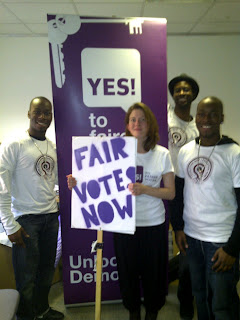
The very mention of the words sounds like the latest reality TV show, but in actual fact – you may not be too far from the truth.
What does the phrase “big society” mean?
For Councillor Saima Mahmud, cabinet member for children and young people(pictured right) and Officer James Gould – Youth consultation & participation, Big Society means financial straits.
London Boroughs currently receive nearly £3 Billion in grants for current Youth initiatives and schemes. With the cutbacks proposed, all of this funding will be withdrawn and consolidated into one grant called the “Early Intervention” grant.
It is from this one grant, the council must try to fund ALL existing projects.
James further dispelled the old stereotype that young people just don’t care.
He went on to tell us that although the police are bringing back stop and search within the borough, the local police have been working with local youth to create methods of carrying out these searches that will be more appropriate.
The biggest loss suffered with the governments’ cutbacks was the Building Schools for Future programme – which would have seen 19 of the boroughs most dilapidated schools modernised.
The borough has seen a very big interest in the free schools initiative announced by the government, with no less than 7 community groups registering their interest to open one of their own.
A Free school only has to pledge to teach the core subjects of English, maths and science – the rest of the curriculum they teach is entirely up to them. Once it has been confirmed, the school will be placed in either under used council buildings or buildings up for disposal.
They are given these buildings for FREE and under a 125 year lease!
The council have several of these buildings available but as you can imagine – these buildings may be available but they can also be sold for a sizeable profit…
In Waltham Forest, there are 10,000+ homes and a waiting list of 16,000+ people. With the coalition’s proposal to move tenants from their homes after 5 years and more people moving into the borough than out – overcrowding is more of an issue than ever.
What does this mean for young people leaving home at ever younger ages for a variety of reasons? Where do they fall on the waiting list?
HOWEVER, there are proposals to reprise the opening of schools during the summer holidays to assist adult learning, filmmaker classes and even learning how to DJ. With a turnout of over 1,300 local residents the scheme is just a small example of Waltham Forest Council’s determination to provide a silver lining.
Want to do more for YOUR borough? Contact your local council and find out how!

